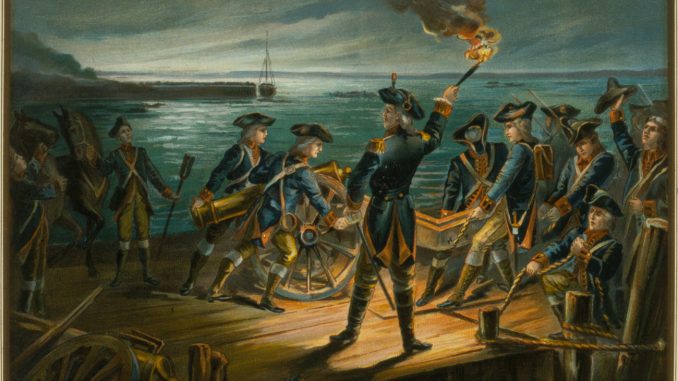
On this day, in 1776, Admiral Richard Howe and General William Howe, “the King’s Commissioners for restoring Peace,” issue a proclamation from New York City, promising pardon to those who will within 60 days subscribe to a declaration that they will desist from “Treasonable Actings and Doings.”
The Howes’ offer appealed to thousands of residents from downstate New York, who were willing to trade in their weapons for pardons. At the time, Westchester, Manhattan and Long Island were securely in British hands and would remain so until after the Treaty of Paris was signed in 1783.
General William Howe’s large army had arrived on Long Island on August 22, hoping to capture New York City and gain control of the Hudson River, a victory that would divide the rebellious colonies in half. Five days later, on August 27, the Redcoats marched against the Patriot position at Brooklyn Heights, overcoming the Americans at Gowanus Pass and then outflanking the entire Continental Army. The Americans suffered 1,000 casualties to the British loss of only 400 men during the fighting. Howe chose not to follow the advice of his subordinates, however, and did not storm the Patriot redoubts at Brooklyn Heights, where he could have taken the Patriots’ military leadership prisoner and ended the rebellion.
General Washington ordered a retreat to Manhattan by boat. The British could easily have prevented this withdrawal and captured most of the Patriot officer corps, including Washington. However, General William and Admiral Richard Howe still hoped to convince the Americans to rejoin the British empire in the wake of the humiliating defeat, instead of forcing the former colonies into submission after executing Washington and his officers as traitors. On September 11, Benjamin Franklin, John Adams and other congressional representatives reopened negotiations with the Howe brothers on Staten Island. The negotiations fell through when the British refused to accept American independence.
The British captured New York City on September 15; it would remain in British hands until the end of the war. By contrast, upstate New York suffered through a civil war between Patriot and Loyalist fighters, most of whom were New York born and bred. After the Treaty of Paris, the British evacuated their New York Loyalists to remaining British territories, mainly in Canada, where they ultimately created the present-day province of Ontario.
[adrotate banner=”24″]

[pt_view id=”517b65fj16″]



Be the first to comment